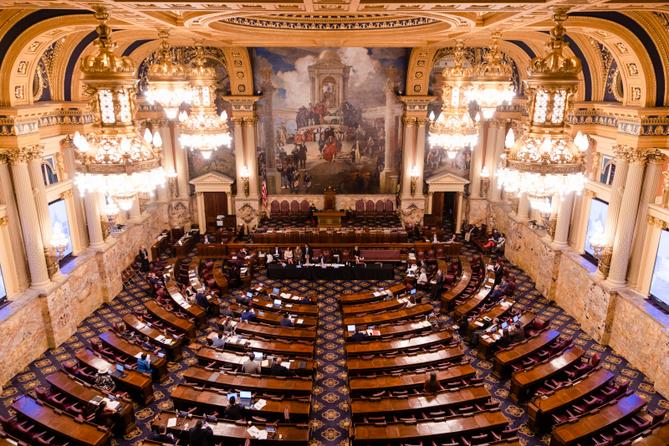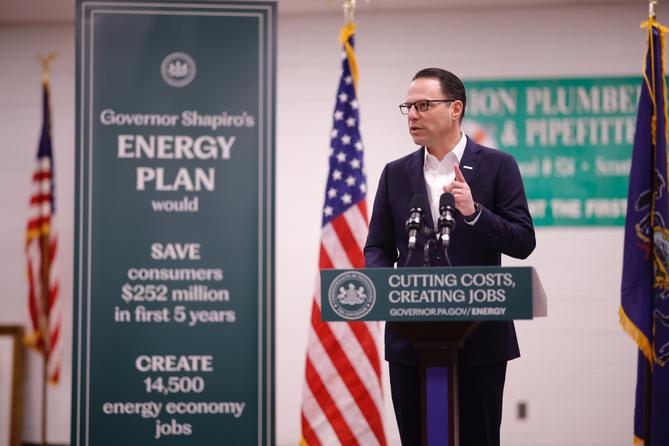Spotlight PA is an independent, nonpartisan, and nonprofit newsroom producing investigative and public-service journalism that holds power to account and drives positive change in Pennsylvania. Sign up for our free newsletters.
HARRISBURG — As part of what his administration is calling a “new era” of energy policy, Gov. Josh Shapiro is proposing a state-based alternative to a cap-and-trade program aimed at fighting climate change, and a boost to renewable energy standards.
This approach to reducing emissions marks a departure from the course set by the Democrat’s predecessor, Gov. Tom Wolf, who tried to unilaterally force Pennsylvania to set carbon caps.
Shapiro seeks GOP buy-in, so the future of his plan relies on uncertain support from a state Senate that has long resisted placing restrictions on the oil and gas industry.
“Now is the time to keep people coming together, to hear Democrat and Republican voices at the table, and to get stuff done for our fellow Pennsylvanians,” Shapiro said at a March news conference. “Doing nothing is not an option.”
While labor, environmental, and consumer protection groups have met Shapiro’s proposal with optimism, state Senate Majority Leader Joe Pittman (R., Indiana) has pushed back, saying that any form of cap-and-trade program would be “a very difficult piece to support.”
He expressed openness to changing the state’s renewable energy standards but said that ultimately, “once the House sends it to us … understanding what those details are will be extremely helpful.”
One cornerstone of the plan is the Pennsylvania Climate Emissions Reduction Act, which would allow the state to cap the amount of carbon power plants can produce and force them to pay to emit pollution.
The idea is similar to the Regional Greenhouse Gas Initiative, a multistate cap-and-trade program championed by Wolf; Shapiro has not embraced it because he is unsure it would benefit consumer interests.
The other bill, dubbed the Pennsylvania Reliable Energy Sustainability Standards Act, would increase the amount of power electricity companies have to buy from renewable energy sources.
Here’s what you need to know about Shapiro’s proposals and their likelihood of passing the state legislature:
What is PACER?
During his run for governor, Shapiro declined to say whether he’d keep Pennsylvania in the Regional Greenhouse Gas Initiative.
RGGI is a cooperative of nearly a dozen states that agree to limit carbon emissions. These limits vary, but states coordinate them so that total reductions meet the initiative’s agreed-upon environmental goals.
Participating states require most power plants that operate within their borders to buy allowances to emit carbon, which can be purchased at quarterly auctions. Price floors and ceilings are set by the states. Each state recoups revenue, which can then be used for climate mitigation projects, for driving down consumer costs, or for other purposes.
Wolf made Pennsylvania a member through executive action, but the state’s participation has so far been blocked by courts.
A few months after taking office, Shapiro convened a working group to evaluate RGGI and possible alternatives. The group recommended the state pursue cap-and-trade to meet Shapiro’s goals to meaningfully address climate change while also protecting jobs and consumers.
PACER would give the commonwealth the ability to set its cap on carbon emissions, rather than use one determined by the RGGI program participants collectively. The program would be run by the Department of Environmental Protection, Shapiro said.
The state would be free to decide what to do with the revenue, and Shapiro wants to use the bulk of it to fund electric bill rebates. (Because of the way Wolf justified Pennsylvania’s entry into RGGI, the state would be required to put allowance revenue into the Clean Air Fund, which supports pollution reduction efforts.)
Shapiro has said that if the legislature passes PACER, he will pull out of RGGI.
Groups that favor cutting emissions have largely come out in support of PACER, but have expressed concerns about the lack of key details.
Namely, they want to know how DEP would determine how much carbon polluters can emit and how much they would have to pay to emit. How the carbon auctions will be administered and how frequently auctions would take place are also among environmentalists’ concerns.
Rob Routh, a policy director at the Natural Resources Defense Council, wonders if PACER will use the same cap on carbon emissions as RGGI. If lawmakers limit DEP's ability to set a carbon cap to appeal to energy companies or state Senate Republicans, PACER could prove less effective than its interstate counterpart.
Routh also questioned whether out-of-state energy companies would be able to participate in PACER’s carbon allowance auctions. RGGI’s auctions are regional, meaning an energy company in Connecticut can buy an allowance from Rhode Island, for example, which creates a large market.
Routh added that he broadly supports Shapiro’s initiative “so long as any cap-and-invest program can deliver equivalent or superior benefits” to RGGI.
Currently, two other states have their own cap-and-trade programs: California and Washington. They set carbon caps, which apply to power plants, fuel distributors, and other related industries, and they host quarterly auctions.
One clear difference between RGGI and PACER is the way Shapiro proposes to spend revenue. Rather than automatically funneling it into the Clean Air Fund, as RGGI would do, Shapiro says he wants PACER revenue to go toward programs that would cut utility costs.
Shapiro calls for 70% of the revenue to be returned to consumers in a rebate that would be deducted from residents' electric bills, which he projected would save ratepayers $252 million in the first five years.
Some of the remaining revenue would fund a year-round version of the state’s Low-Income Home Energy Assistance Program, which currently lets qualifying households apply for heating bill help from November to April.
Another part of the revenue would go to a new fund for energy projects in industries favored by state Senate Republicans, such as carbon capture and storage, retrofitting natural gas plants, and hydrogen production.
During his announcement, Shapiro also named as potential funding targets several long-time priorities for consumer protection advocates, such as lowering reconnection fees and expanding access to waivers that can prevent utility shut-offs for people with illnesses.
Liz Marx — executive director of the Pennsylvania Utility Law Project, an organization that provides legal aid to individuals struggling with housing or utility issues — applauded the proposals, saying that she is encouraged to see Shapiro grouping environmental goals with consumer protections.
She noted that her position may change depending on the final language of the bills and how the legislature proceeds, adding that her support depends on whether lawmakers pass “PACER without PRESS, PRESS without PACER, or PRESS and PACER without LIHEAP and other consumer protections.”
“We’re seeing energy transition happen before our eyes. This proposal gives us a roadmap for taking some action,” Marx said.

What is PRESS?
Shapiro’s second proposal asks the legislature to amend the state’s Alternative Energy Portfolio Standards Act, which would fulfill a promise he made on the campaign trail to increase the state’s renewable energy production.
Currently, Pennsylvania requires electricity companies to buy 8% of their power from so-called Tier 1 renewable sources such as wind or solar and 10% from Tier 2 sources like waste coal.
Shapiro wants to up the Tier 1 standard to 35% by 2035. He also wants to create a third tier with a 5% requirement, while the Tier 2 standard would remain the same.
Tier 1 would be expanded to include nuclear sources, while Tier 2 would add burgeoning energy industries for which the state has yet to establish separate regulatory processes. That includes coal- and natural-gas-powered hydrogen production. Tier 3 would include natural gas that utilizes carbon capture technology.
Shapiro argued during a news conference that adding nuclear power and carbon capture as a part of the state’s renewable energy standards would attract new economic investment and create over 14,500 jobs. He did not specify how or where those jobs would be created, but said that increased demand for new energy sources like nuclear would generate construction jobs.
Environmental advocates also said implementing Shapiro's plan would help Pennsylvania qualify for federal tax credits from the Inflation Reduction Act that reward states and corporations for investing in or utilizing renewable energy sources and projects.
Katie Blume, the legislative director for Conservation Voters of Pennsylvania, said she was “thrilled” when she heard Shapiro’s initial goal of 35% by 2035.
However, she said industries such as hydrogen and carbon capture give her pause, adding that any legislation would need to require state oversight.
“These technologies will be less effective without strong regulations because if they end up ultimately polluting our communities, it’s a lose-lose,” Blume told Spotlight PA.
What will the legislature do?
Both PACER and PRESS would require the approval of the state legislature. While some Democrats have voiced support for the programs, party leadership has yet to explicitly back Shapiro’s plan and declined to comment on its position.
The Republican-controlled state Senate has yet to commit either way.
State Rep. Greg Vitali (D., Delaware) leads the House’s Environmental Resources and Energy Committee, through which the bills would have to pass. He supports the programs in theory but said he doesn’t see much hope for getting PACER through the state Senate.
“My initial reaction to PACER is that the better approach is to proceed with RGGI if the court finds it legal,” Vitali told Spotlight PA, referencing the Shapiro administration’s appeal to the state Supreme Court. “The problem with PACER is it’s gonna be dead on arrival in the Senate.”
Vitali added that PRESS might be “worth trying to negotiate,” but would require some horse-trading with state Senate Republicans.
Republicans have been more outspoken about their concerns. Pittman, the state Senate majority leader, released a statement shortly after Shapiro’s announcement that called on the governor to pull out of RGGI but did not explicitly mention either of the programs Shapiro proposed.
In a conversation with Spotlight PA, Pittman was not willing to completely write off Shapiro’s RGGI alternative, saying that he needs the details of what the state House sends his way.
“The key challenge is, a cap-and-tax initiative is punitive and we shouldn’t be having this conversation with a punitive mindset,” Pittman said.
He made similar remarks regarding Shapiro’s PRESS initiative, saying he supported the “general efforts” of the new renewable energy standards program but that passage in the state Senate would be contingent on “what the House ultimately sends us.”
Pittman did say there are a few pieces of Shapiro’s energy package that he feels have potential for collaboration, namely carbon capture and sequestration, hydrogen development, and exploration of more advanced nuclear energy technology.
To advance in the state Senate, the proposals must pass through its Environmental Resources and Energy Committee. State Sen. Gene Yaw (R., Lycoming) heads the committee and told Spotlight PA that he opposes all cap-and-trade programs.
Yaw argued the state should be trying to increase energy production and that a cap-and-trade program would discourage companies from setting up shop in Pennsylvania. He cited a study by PJM, the state’s electricity provider, which found that future energy production may be insufficient to meet demand. Critics have argued those concerns are overstated.
Yaw added that he would consider changing renewable energy standards, saying that he supports energy diversification “in a global sense.” But any bill would need to address his concern regarding increasing the state’s overall energy production, he said.
“The governor never addresses the real problem,” Yaw said.
BEFORE YOU GO… If you learned something from this article, pay it forward and contribute to Spotlight PA at spotlightpa.org/donate. Spotlight PA is funded by foundations and readers like you who are committed to accountability journalism that gets results.
